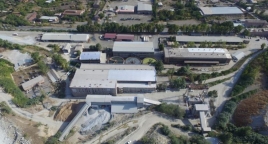British-Based Company Purchases Major Gold and Copper Mine in Armenia
Thursday, February 7, 2019
YEREVAN (RFE/RL) — A British-based company has paid $55 million to buy a major gold and copper mine in Armenia from a Russian metals group.
The company, Chaarat Gold, is the largest Western investor to move into Armenia since last spring’s “velvet revolution” that replaced the country’s former government with a more reform-minded and democratically elected administration.
“Clearly our decision to come here straight after the revolution tells you that … we believe in the positive change that the revolution has brought to the country,” Chaarat’s chief executive, Artem Volynets, told RFE/RL’s Armenian service on Thursday. “We think it’s good to be in an open and transparent society.”
“We believe in transparency and doing things properly in the same way that people in this country believed in transparency when they initiated the revolution,” Volynets said in an interview.
Chaarat completed the acquisition from Russia’s Polymetal group of the Kapan Mining and Processing Company on February 1. The company currently employing about 1,000 people mines gold, copper, silver and zinc near the southeastern Armenian town of Kapan. It reported more than $20 million in earnings last year.
Chaarat is registered in the British Virgin Islands, headquartered in London and listed on the London Stock Exchange’s Alternative Investment Market trading platform. Its largest shareholder is Martin Andersson, a Swedish investor who has a 33.5 percent stake in the company. Switzerland’s UBS Group AG and a state-owned Chinese mining firm are among its smaller shareholders.
Volynets said the purchase of the Kapan mine is part of Chaarat’s plans to create “one of the leading gold producing companies in the former Soviet Union.” “We currently have two very large [gold] deposits in the Kyrgyz Republic which will form the base of our first cluster,” he explained. “The acquisition of Kapan is a logical step in that strategy.”
Chaarat, Volynets went on, views Armenia as the “second cluster” of its operations and could make further investments in the Armenian mining sector, which generated more than 40 percent of the country’s exports worth $2.4 billion in 2018. “If our experience in Kapan will prove to be a successful one, we will look at other opportunities,” he said.
Armenia’s largest mining enterprise, the Zangezur Copper-Molybdenum Combine (ZCMC), is located in Kajaran, a smaller town about 15 kilometers west of Kapan. It has more than 4,000 employees. The German metals group Cronimet officially owns 75 percent of ZCMC.
Another major Western player in the sector is the British-American company Lydian International which had been granted the exclusive right to develop a large gold deposit in the southeastern Vayots Dzor province. Lydian has faced an uncertain future in Armenia since the “velvet revolution.”
All roads leading to the Amulsar deposit have been blocked since June 2018 by several dozen people protesting against gold mining operations there which they say are fraught with serious risks to the environment. Lydian, which claims to have invested more than $300 million in Amulsar, has dismissed these concerns, saying that it will use modern and safe technology. The company has repeatedly demanded an end to what it considers an illegal blockage.
U.S. diplomats have warned that continued disruption of Lydian’s operations could scare away other American investors interested in Armenia. Nevertheless, the Armenian government and Prime Minister Nikol Pashinian in particular have not ruled out the possibility of revoking Lydian’s mining license.
Chaarat’s Volynets said he is aware of the situation around Amulsar. “We believe that if we do things right … we should be fine,” he said when asked about its potential implications for his company.
Volynets insisted that Chaarat will stick to “global standards” for environmental protection in its mining and ore-processing operations in Armenia. He said its most immediate task is to “reinforce” the Kapan mine’s toxic waste disposal dump located just outside the industrial town.
“Mining companies operate in many developed countries, whether it’s the United States, Canada or Australia,” argued the Chaarat CEO. “The important thing is to be responsible for your actions in terms of health safety and environment, and that is very much at the forefront of our activities.”
https://massispost.com/2019/02/british-based-company-purchases-major-gold-and-copper-mine-in-armenia/





